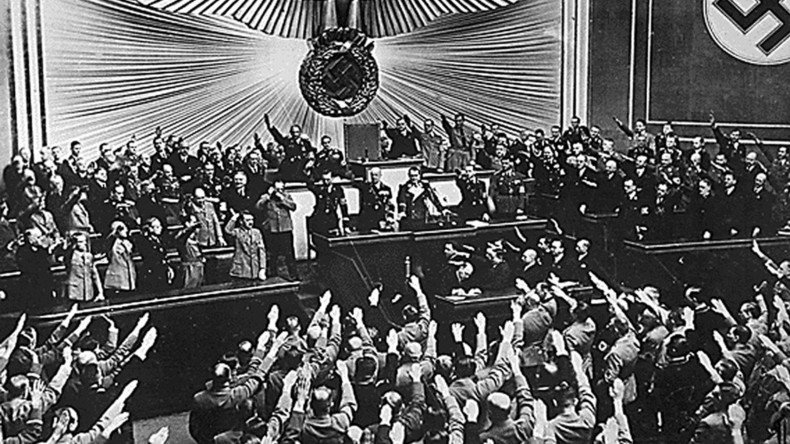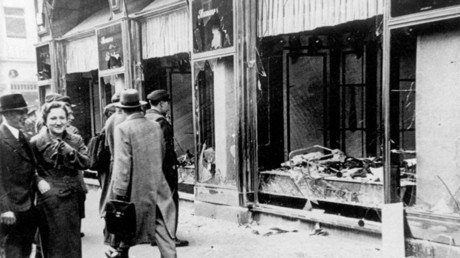Germany launches probe into Nazi influence on post-WWII government

The German government wants to find out how widely Nazi networks proliferated among the post-WWII chancellery, as well as ministries and agencies, launching an in-depth inquiry to unmask one of the most complex parts of the nation’s history.
The inquiry, at a cost of $4.2mn (4mn euros), will run until 2020, the German Ministry of Culture said in a statement on Saturday. A quarter of that amount will specifically be allocated to uncover Nazi influence on the core of Germany’s political power – the Federal Chancellery.
Investigators want to gain insight into the personal connections among Nazi officials before 1945 and look at how they evolved in the form of post-war networking in the chancellery, the federal ministries, and regional authorities, according to Deutsche Welle.
One of the central figures in the inquiry is Hans Globke, a highly controversial West German official who served as chief of staff and trusted aide to the first post-WWII chancellor, Konrad Adenauer, between 1953 and 1963.
Long before his career on Adenauer’s staff, Globke joined the Nazi Interior Ministry and co-authored the official legal commentary to the notorious Nuremberg laws, the racist regulations that later contributed to a large extent to the rounding up and deportation of German Jews during the Holocaust.
Globke’s bosses at the time were Wilhelm Frick, the Nazi Interior Minister who in 1946 was executed by hanging for war crimes, and Heinrich Himmler, the murderous chief of the SS.
After WWII, Globke denied allegations of being a convinced Nazi, claiming that he joined the NSDAP for career reasons only. However, it is known that in 1932, about two months before Hitler took power, Globke wrote a set of rules which made it harder in Prussia – where he worked at a regional interior ministry – for Germans of Jewish origin to change their last names to less recognizably Jewish names.
Given that Globke was in charge of Chancellor Adenauer’s recruitment policy, the inquiry will look at the profiles of those offered jobs in West Germany’s government. It is unclear if Adenauer himself, longtime mayor of Cologne under the Hitler regime, will be subject to the probe as well.
The ambitious research project will also target the influence of Nazi-era lawyers who went on to occupy senior posts in West Germany’s Justice Ministry. According to an October government report cited by Sueddeutsche Zeitung, in 1957, around 77 percent of the ministry’s officials were former members of the Nazi party.
“We didn’t expect the figure to be this high,” admitted study co-author Christoph Safferling, who evaluated numerous files of justice ministry officials.
German politician appeals sentence over Nazi & Auschwitz tattoos, gets harsher punishment https://t.co/a4mbkGB2ct
— RT (@RT_com) 8 ноября 2016 г.
However, there are signs that the inquiry may not go as smoothly as planned. Many files with tip-offs leading to traces of former Nazi officials in post-war Germany still remain classified, while some of them were even shredded by German secret services.
In the late 1990s, the German intelligence agency, the BND, came under intense scrutiny for destruction of files containing conflicting information as to whether Alois Brunner, a high-ranking SS officer and close confidant of Adolf Eichmann, the architect of the Holocaust, had worked for the agency at some point.
Similar inquiries have previously been initiated by Germany’s Foreign Office, the criminal police, as well as the counter-intelligence agency BfV. Critics, such as Left Party MP Jan Korte, have raised doubts over the independence of the researchers taking part in the inquiries.
25 Nazi Waffen-SS veterans found living freely in Britain
Speaking to Deutsche Welle earlier in November, he said the government agencies tended to control the researchers and forced them to concede for numerous conditions, including a ban on making any public statements during the probes. Each statement was also required to be discussed beforehand with the head of the project at the BfV.
“That is censorship and not befitting of what's at stake here,” Korte maintained.













